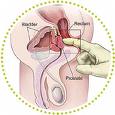|
|
|
HomeNDCOnline CoursesASVAB PracticeUSAF PDG TestsUSVCP StoreDischarge CertificatesVeteran Directory2016 Comp RatesSMC RatesEmergency Data CardVeteran ID CardLuggage ID CardDisabilitiesBusiness DirectoryVerify ServiceBenefits NewsComp QuestionsCompensation NewsHow to WinVet CentersVSO DatabaseVA Regional OfficesState BenefitsSVC CompensationCompensation FAQsAgent OrangePsych CompMST CompensationRare CompensationLocate War BuddyMedical RecordsStressor LettersFormsBrochuresFREE GuidesVideosPress ReleasesContact UsMembershipUpcoming EventsDiscountBizArchive RecordsHomeless AlertSubmit ArticleVSO of the YearClassifiedsAbout USVCP
|
Prostate Cancer Prostate cancer is cancer of the small walnut-shaped gland
in males that produces seminal fluid, the fluid that nourishes and transports sperm. Prostate cancer is one of the most common
types of cancer in men, affecting about one in six men in the United States. A diagnosis of prostate cancer can be scary not
only because it can be life-threatening, but also because treatments can cause side effects such as bladder control problems
and erectile dysfunction (impotence). But diagnosis and treatment of prostate cancer have gotten much better in recent years. Prostate cancer usually grows slowly and initially remains confined to the prostate gland,
where it may not cause serious harm. While some types of prostate cancer grow slowly and may need minimal or no treatment,
other types are aggressive and can spread quickly. If prostate cancer is detected early — when it's still confined to
the prostate gland — you have a better chance of successful treatment. Symptoms Prostate cancer usually doesn't produce any noticeable symptoms
in its early stages, so many cases of prostate cancer aren't detected until the cancer has spread beyond the prostate. For
most men, prostate cancer is first detected during a routine screening such as a prostate-specific antigen (PSA) test or a
digital rectal exam (DRE).
When signs and symptoms do occur, they
depend on how advanced the cancer is and how far the cancer has spread. Early signs and symptoms of prostate cancer can include urinary problems, caused when the prostate
tumor presses on the bladder or on the tube that carries urine from the bladder (urethra). However, urinary symptoms are much
more commonly caused by benign prostate problems, such as an enlarged prostate (benign prostatic hyperplasia) or prostate
infections. Less than 5 percent of cases of prostate cancer have urinary problems as the initial symptom. When urinary signs
and symptoms do occur, they can include:
Cancer in your prostate or the area around the prostate can
cause:
Prostate
cancer that has spread to the lymph nodes in your pelvis may cause:
Advanced prostate cancer that has spread to your
bones can cause:
[ Back ] |
|
|
|
